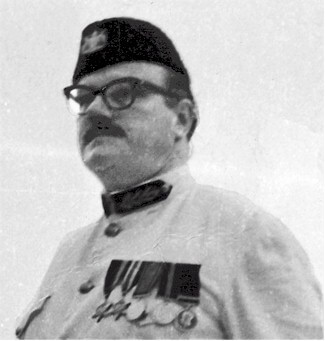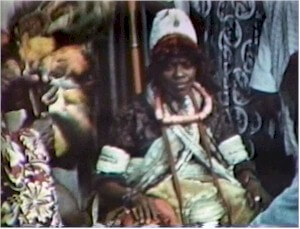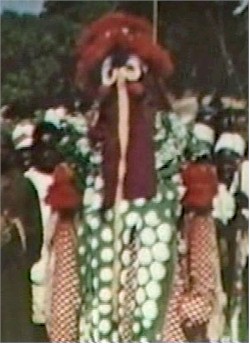Ricochet is the best place on the internet to discuss the issues of the day, either through commenting on posts or writing your own for our active and dynamic community in a fully moderated environment. In addition, the Ricochet Audio Network offers over 50 original podcasts with new episodes released every day.
 Tall Tales: Gagara Yasin
Tall Tales: Gagara Yasin
 The year was 1956.
The year was 1956.
I knew something was horribly wrong that night, when Ahmadu dropped the soup! Normally exquisitely self-possessed, immaculately groomed, and imperturbable, our man-servant and friend was disheveled, the color of cement, and shaking like a leaf with acute anxiety and palpable fear.
Our little family—myself, Kay, and our imperious eighteen-month-old daughter, known behind her back as “She Who Must Be Obeyed”—were living in Idah at the time, among the people of the Igala kingdom.
I had visited Idah once before, the previous year, in order to observe the burial of an Ashadu, or high tribal adviser. This particular Ashadu had died at least four months before he was buried, for the Igala not only bury their important personages in pyramids (and in canoes in those pyramids too) but they also mummify them first–and that takes at least ninety days.
The only snag with the ceremonial is that, lacking the technological skills (or the materials) to build their pyramids upwards, the Igala have to compromise by digging them downwards, starting with a forty foot or so square and then digging nine steps from that on each side, a little less than two feet wide and each about two and a half feet high, to end in a square some 8’ X 8’ at the bottom. There the shrouded and mummified corpse is laid to rest, sealed in a canoe and surrounded by everything that he might need in the afterlife. The hole is then filled in with soil, calabash-full by calabash-full.
My job, on my first visit to Idah, was quite simple: watch the Ashadu’s burial so that the Colonial Office could certify that nine onigbo, or slaves—one on each step and with both kneecaps smashed so that they were unable to clamber out as the grave was filled in—had not been buried alive with him!
I did so. Apparently well enough that when further Colonial Office action was warranted in the region, I was summoned.
This time, my job was to investigate the Attah of Igala, a priest-king who ruled his people on the one hand with an iron fist, and on the other with the assistance of a mish-mash of African traditional religions, juju, and sacrifice (both animal and—it was said—human).
 The position of Attah is hereditary, but not direct, in that the heir is always chosen after the incumbent’s death from one of the royal houses of the kingdom. The first Attah, Ebule-jonu, (who ruled in the fifteenth century), was a woman. Since then, most of the Attahs have been men (attah means “father” in the Igala language), but there have also been several female Attahs, as the kingdom recognizes their hereditary right in in the line of succession.
The position of Attah is hereditary, but not direct, in that the heir is always chosen after the incumbent’s death from one of the royal houses of the kingdom. The first Attah, Ebule-jonu, (who ruled in the fifteenth century), was a woman. Since then, most of the Attahs have been men (attah means “father” in the Igala language), but there have also been several female Attahs, as the kingdom recognizes their hereditary right in in the line of succession.
The activities of the current Attah, Ameh Oboni, had come to the attention of the Colonial Office, which was appalled at the reports it was getting from Igala, and which was particularly concerned about speculation of a planned human sacrifice at the upcoming Agricultural Festival.
I was ordered to look into this.
It seemed to Kay and me, as we drove into Idah, through the blood-spattered archway into town, upon which had recently been spitted a live cockerel—in our honor, we were told—that we could smell the kingdom’s fear.
I was only slightly reassured, upon discussions with the Attah and his henchmen, to discover that the sacrifice planned at the Festival was not that of a young woman, but that of a young she-goat who would be killed by the traditional Igala sacrificial method of vaginal evisceration.
The Colonial Office would never tolerate such an inhumane execution, I told the Attah. Either the method would have to change, or the animal would have to be killed humanely first.
The Attah agreed that the goat’s throat would be cut before the official ceremony began.
However, as I stood there on the day, on the field, togged out in my glad rags and medals, it was clear that the Attah had not kept his word, and that although this particular victim was not human, the methods of sacrifice described in the reports were true.
I wrote up my report, sent it in to the Office, and waited for the other shoe to drop.
Very soon, it did. The Attah was called to Kaduna to explain himself, and to be told that things in his kingdom would have to change. Instead, he agreed to resign, and on the journey back to Idah, he hanged himself.
Thus began the process of choosing his successor.
The two candidates, from two of the royal houses, were very different. One was a man in his late 70s, from the same royal house as the previous Attah (a small advantage) who spoke no English, was set in his ways, had most recently retired from his District Headship, and was illiterate in any language. The other candidate was much younger, well-educated, an Instructor at an administrative school in Zaria, and his English, both spoken and written, was excellent.
The Igala elders, who favored the pretensions of the older gentlemen, and who saw me as a modernizing influence and a potential, powerful, threat, were naturally dismayed at my continued presence in Idah which, they thought, might queer the pitch of their preferred candidate.
So, back to the soup.
We sat Ahmadu down and asked him what the matter was. When he had calmed down sufficiently to speak, he explained that a person had come to the house and delivered a message that the elderly candidate’s royal house had paid a local witch doctor of formidable reputation nine black goats and a virgin handmaiden in order to put a curse on me!
We told Ahmadu to put the rest of the meal on the table so we could help ourselves, summoned the smallboy to clean up the mess (Ahmadu had dropped the soup, tureen and all), and sent Ahmadu off to bed. As he took himself off, still trembling, I added (with what I now realize was almost foolhardy bravado), “Let us see what happens in the morning.”
Next morning, we got up early, as usual. Ahmadu brought my shaving water and put out my clothes, as usual. He said nothing about the events of the previous night. Neither did I.
Spring is the hot season in Igala, and at the time our office hours were from 7AM to 9AM, followed by breakfast, then office from 10AM until 2PM, followed by an afternoon break and a return to work from 4PM to 6PM.
And so, at a few minutes before seven o’clock, I turned into the square in front of the Divisional Office, ready to get to work.
Rather unusually, the square was jam-packed with people, most of them women, and as soon as they saw me, they started ululating and throwing dust on their heads—the traditional invocation for forgiveness and demonstration of repentance.
I parked the car in the portico, got out, went up the steps to my office, and sat down. Today, instead of the usual hive of activity, there did not appear to be another soul in the entire complex.
For several minutes, I shuffled papers between my “IN,” “OUT,” and “PENDING” trays, in an attempt to create an appearance of normality, and eventually I observed a face, at floor level, peering around the door jamb.
It was my head messenger, Umaru, to whom I gestured, in the traditional manner, to approach.
Umaru crawled into the room, not on his hands and knees, which would have been bad enough, but on his belly, which was abject and awful! Somewhat peremptorily, I told him to stand up, and with the utmost diffidence and reluctance, he did so.
Umaru Obareku was a magnificent individual. He spoke eight languages fluently, including English, French and German, but since he could only write in Arabic script he had been deemed, by some half-witted government official, to be “illiterate,” and his opportunity for advancement was severely constrained as a result.
Today, though, he was a very frightened man.
Once Umaru had stood up, resumed his fez and his turban, sorted himself out and composed himself, I asked him again what was the matter. All he could bring himself to do was to say, in Hausa, “Haven’t you heard?”
Rather irascibly, I pointed out that it was not my job to tell him what I had heard, it was his job to tell me what he had heard. And eventually, he blurted out, “When the witch doctor got out of bed this morning, as soon as he put his foot on the ground, he fell down dead! Gagara yasin, ke nan? (His cards were trumped, were they not? Or, as the translation came to be told, “The Curse Rebounded.”)
That is how Gagara Yasin came to be the second vernacular nickname with which I was endowed during my time in Nigeria.
Subsequent, and closer, inquiry elicited a few other facts:
It was Umaru who had been ordered up to the house the previous evening to deliver the ‘curse’ message to me, as in order for the curse to be effective, the victim must be made duly aware that he or she has been subjected to it. However, his courage failed him when he arrived at the house, and rather than tell me, he had told Ahmadu, and then waited for Ahmadu to come back and tell him my response. My response, of course, was “Let us see what happens in the morning.”
Ahmadu gave this news to Umaru, who duly reported it back to the royal house.
 Meanwhile, the witch doctor, by no means in his first youth, apparently enjoyed a riotous night with the goats and the virgin handmaiden (all of which were sent back, only lightly used, to their respective donors, shortly after the events recounted here). When he got up out of bed, and set his foot on the ground, he did, indeed, fall over stone cold dead.
Meanwhile, the witch doctor, by no means in his first youth, apparently enjoyed a riotous night with the goats and the virgin handmaiden (all of which were sent back, only lightly used, to their respective donors, shortly after the events recounted here). When he got up out of bed, and set his foot on the ground, he did, indeed, fall over stone cold dead.
Whether this was a physical phenomenon, or a psychosomatic one, we shall never, know, though much weight was placed upon the fact that he was not stricken until his foot touched the ground, with all the connotations of the magic imputed to Mother Earth, and of her power in overcoming evil.
Whatever the reason, I was conscious for a considerable time thereafter of a distinct reluctance in many quarters to challenge my rulings or to digress (even ever-so-slightly) from my opinion. In many respects, this made life a great deal easier!
As far as the older candidate was concerned, though, his goose was now cooked. He had tried his best pitch, and lost. The younger man’s candidacy was proposed, and accepted, with widespread acclamation. Attah Aliyu Ocheja Obaji ruled the Igala for fifty-six years, and died in 2012 at the grand old age of 102.
******
For your listening pleasure, I offer the following musical interlude, one of 1958’s top recordings in both the UK and the US. It drew fascination because it was the first popular use of a clever trick of mid-twentieth-century technology (which would come to annoy us all greatly over the years, particularly at Christmas, in many more recordings from the same guy, ostensibly by a trio of buck-toothed anthropomorphic rodents).
 But in 1958 it was new, it was hot stuff, and it was a great hit at the Kaduna Officers Club. When my mother brought the 45rpm record home, I liked nothing more than to wind up the old blue gramophone (many places I lived while I was growing up had no electricity), play it, and dance around like a dervish. Or perhaps like the witch doctors that I had seen, and among whom I had lived.
But in 1958 it was new, it was hot stuff, and it was a great hit at the Kaduna Officers Club. When my mother brought the 45rpm record home, I liked nothing more than to wind up the old blue gramophone (many places I lived while I was growing up had no electricity), play it, and dance around like a dervish. Or perhaps like the witch doctors that I had seen, and among whom I had lived.
True music lovers, please be gentle. I was not quite four years old. Here it is:
******
Published in Group Writing





Fantastic! Thanks for sharing.
Excellent! The frequent use of translated terms led me to believe that this whole thing was setting up an elaborate pun, but I was not disappointed to get a great story instead.
Very good. I enjoyed the story and it was well told. Thanks for posting it.
Are the movie rights for sale?
I wish. I have about another 250 pages that go on in much the same vein. What to do with them, since Dad died in 2007, has been vexing my sister and me ever since. The stories (and there are many, including the one about the cannibal king who ate the local tax collector–that’s always a hit, but I’ve told it before on Ricochet, and I didn’t want to bore anyone, or repeat myself), are so unbelievable (although I was old enough to remember many of them, so I know they are absolutely true, and I even played bit parts in a few of them), but Dad’s expository style is, to say the least, dense and elliptical. And exclamatory!!!!!
I’ve recently come to believe that the thing to do is take them individually as episodes, weave in a bit of history and background, and give each one a beginning, middle and end, then serve them up as an interconnected set of stories, rather than the long narrative slog Dad envisioned starting in 1947 and ending in 1963.
This is an early attempt to do something like that and see how it works.
Thanks. Much of the credit for the telling, as I said in the previous comment, must go to the late Gagara Yasin himself.
Please do this. Everyone else, Recommend this so we can whet the world’s appetite for it.
Are you saying he left an unfinished manuscript?
You might enjoy reading “The Missionaries” by Owen Stanley.
If you do have a manuscript you could try editing it and submitting it to Castalia House who might well publish it.
Great story, I really enjoyed it.
I love the way you start the story:
It reminds me of this scene from one of my favorite movies:
Thanks for your kind words.
He left his ‘memoirs.’ They’re complete (he finished them not long before he died). He writes wonderfully, and the pages are jam-packed with tremendous detail, but he never uses a simple sentence when a compound one will do, and he draws a lot of parallels and makes a lot of references that will be lost on today’s readers or someone who isn’t pretty familiar with the British Colonial presence in West Africa.
Both my mother and father are gone, and my sister was only two when we left Nigeria, so I’m really the only one who remembers much of our life there. Hence, my attempt to sort this out.
Thanks for the tips. I will follow up on both.
More of this please!
This knocked my socks off. I would read the book.
What an absolutely wonderful story! Thank you for diverting our attention from the election in such a pleasant and thorough way.
Great story, well told! I would venture that relating an interconnected set of stories would go far to give the flavor of living in that place and time.
Wow. Incredible! Every comment above captures my Wow!
More please!
P.S. And that picture of you. What a cutie!
Well worth the effort. Thank you.
I’m trying to imagine your father’s resume. Subsequent job interviews must have been a hoot.
Fascinating story, thanks!
Much to my surprise, Wikipedia has an entry for this personage (spelled Aliyu Ocheja Obaje, https://en.m.wikipedia.org/wiki/Aliyu_Obaje ). This skimpy biography gives his birth year as 1920 rather than 1910 and provides the name of the Attah Igala who hanged himself on the way back to Idah (Adeh Oboni).
There are a significant number of topics for which I don’t trust the veracity of Wikipedia’s content, but I am always amazed by the range of its index.
Great!
My 4 year old daughter in 1962 loved the Witch Doctor just as much. Hadn’t thought of that song in 50 years. Wonderful story.
He was an original. I’ve never known anyone quite like him. When I am trying to describe him to someone who never met him, I always start by saying, “Things didn’t happen to Dad, Dad happened to things.”
The first widely-known instance of this in family lore (I am sure there were earlier, unrecorded, ones) was that of Dad’s role as the “Pirate King” in a school production of Gilbert and Sullivan’s The Pirates of Penzance.
He must have been in his early teens at the time, and even then, an impressive sight as he strode onto the stage with his cloak held tight in folds against his chest.
As he started to sing, he flung his arm wide in an expansive gesture, opening his cloak, the heavy velvet of which swished very satisfactorily across the stage and knocked all the footlights into the orchestra pit.
The curtain was rung down, the mess cleaned up, the wounded tended to, and eventually, the performance resumed.
After leaving school, he had a reasonably distinguished several years in the British Army, where he served, among others, in North Africa and at Anzio, and marched into Rome with Mark Clark’s army in June of 1944 (where he gatecrashed his way into an unscheduled meeting with the Pope).
Then to Nigeria and the Colonial Service, until 1963, followed by a year as a Fellow at Harvard (he was helped to that position by a number of UN and US diplomats he’d met in Nigeria). There he wrote the first of a dozen or so books, all of them histories and textbooks, some in English, some in Hausa. His boss at Harvard was Henry Kissinger, whose title was (I think) Director of the Center for International Affairs at the time.
Then, Duquesne University in Pittsburgh took a flier on him and hired him as an Instructor in the African Institute. Since he didn’t have a lick of “higher” education, they told him he’d have to get some academic credentials. So he got an MA and a PhD at Pitt, in the evenings while working full time during the day.
He retired in 1978, and he, my mother, and my brother and sister all went back to England. Dad, of course, began another career, in politics, and was a (Conservative) County Councillor for years. Had my mother been well, and been able to cope with the social obligations, the general opinion was that Dad would very easily have found his way to Parliament. At some point, post-Maggie, he dumped the Conservatives and ran, and won, until he retired at about 80, as an Independent.
It’s probably apparent that I’m a daughter whose always loved her father very much. I miss him every day. There was never a dull moment when Dad was around.
Yes, there are many different spellings of the names, and even of words in the Igala language because nothing is really standardized. Even the word “Attah” is sometimes spelled without the final “H,” so you just have to pick one style and go with it.
Since Dad died in 2007, the onus for getting the age of the last-but-one Attah right is on me. He died in 2012, and many of his obituaries give his age as 102. I’m guessing they’re probably right.
The photo of the ‘witch doctor’ in the OP actually is an Igala witch doctor, and it’s a freeze frame from the 8mm film that Dad took during a couple of different Royal visits to Nigeria. (Same for the photo of the Attah). Of course, there’s more to the story of Dad and his film:
After the “Royal” photographer who was tasked with taking the official film of one of the visits (there was one was in 1956, I think the other was in 60 or 61, but it was the first visit that had the problem) got back to England, he discovered that something had gone wrong in the developing and that all his film was therefore blank.
Someone told the Royal Family that Dad had miles of film that he had taken of the visit, so he was ordered to splice it into some kind of order, with some title frames for context, and bring it, and my mother to Kensington Palace to meet the Duke and Duchess of Gloucester for dinner and a show. He and Mum complied, and a copy was made of Dad’s film, for the Royal Archives.
Because, Dad.
Official Cinematographer to Her Majesty the Queen.
Just too cool!
Really wonderful. Loved it!
Great story, Great writing!
Unfortunately, I don’t believe I’ll ever be able to get the phrase “young she-goat who would be killed by the traditional Igala sacrificial method of vaginal evisceration” out of my head.
She,
Absolutely capital!!!!
You know, before there were deplorables there were detriments.
Regards,
Jim
Wonderful story, She. Clearly you came by your superpowers honestly!
Hi Jim
Good to hear from you as I suspect you’re the only person who’ll comment who’s actually met Himself.
Isn’t that the absolute truth?
Wow. Magnificent.
PLEASE publish a book – I would love to read it.
Thank you!!!